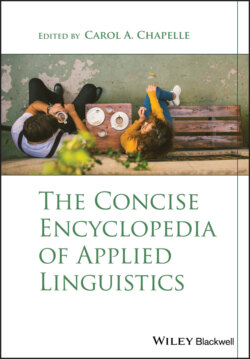Читать книгу The Concise Encyclopedia of Applied Linguistics - Carol A. Chapelle - Страница 38
Significance of Agency in SLA: A Theoretical Overview
ОглавлениеThe concept of learner agency has played a significant part in applied linguistics and second language acquisition (SLA) research for a long time. This is despite the fact that the term “agency” started to appear in SLA research articles fairly recently, influenced by sociocultural, poststructuralist, and critical theories. The significance of agency in SLA evolves through the history of SLA as a discipline.
With the advent of the so‐called “cognitive revolution” brought about by Chomsky (1959) and others, SLA research and pedagogy influenced by behaviorism (e.g., audiolingualism) gave way to psychological perspectives that regard language acquisition as a cognitive process. Unlike behaviorists, who see human actions as being at the mercy of external forces (that is, as reactions to stimuli and habit formation), cognitive psychology places human cognition at the core: Humans think, memorize, and try to understand and make meaning (William & Burden, 1997). People are regarded as active participants in the learning process, that is, as agents who can make choices regarding their behaviors and who have control over their actions and are therefore agentive. The cognitive perspective has influenced research into the psychology of L2 learners, including motivation (William & Burden, 1997), in which a humanist conceptualization of autonomous individuals is at the core.
During the 1980s and 1990s, cognitive‐interactionist models, represented by, for example, the input, interaction, output, and noticing hypotheses, became mainstream in the field. They focus on learners' cognitive processes of L2 acquisition through interactions with external factors (Ortega, 2009). In the mid‐1990s, a new trend characterized as the “social turn” (Block, 2003; Ortega, 2009) called for research informed by social theories. Within this trend, which encouraged researchers to turn to the sociocultural contexts in which language learning takes place, a new conceptualization of agency emerged. Within this broadly social approach, SLA is seen as embedded in sociocultural and macrosociopolitical contexts. From this perspective, viewing language learning as a purely cognitive process has been criticized because the approach fails to account for contextual forces and the sociocultural mediation that necessarily affect language learning.
In Vygotskyan sociocultural theory, the development of higher mental functions in a child is seen as originating in the child's interactions with adults mediated by physical and psychological tools. A child gains agency as he or she develops mental functions that allow for greater self‐regulation. Using this approach, SLA research also regards social interactions with more capable others and guidance by them as significant. As the novice gains greater ability to function autonomously, the experts relinquish control to the novice at the appropriate time (Lantolf & Thorne, 2006).
Since the social contexts surrounding individuals differ from person to person, the emphasis of research within this framework has shifted from universal processes of SLA toward paying attention to the unique situations in which language acquisition takes place. As a result, individual learners' histories, learning trajectories, and identities are taken into consideration and accounted for.
Another important historical development that has influenced the view of agency in SLA is poststructuralism along with the array of critical theories that followed. As part of movements from structuralist (including the complete denial of human agency, e.g., Levi‐Strauss) to poststructuralist perspectives (e.g., featuring the power of discourses), humanist approaches to research centering on sovereign individuals were attacked. Meanwhile, social theorists such as Bourdieu (1977) and Giddens (1984), who attempted to find the connection between structure and agency, influenced the understanding of agency in SLA. Although human beings are not free agents because they are constrained by social structures and forces, neither are they entirely controlled by forces beyond their purview. Humans can make changes to structures. Along these lines, the influence of critical theories, including British cultural studies, postcolonial, and feminist theories crept into SLA approaches to agency. Here, the attention was on sociopolitical situations and discourses that produce inequalities among individuals. Thus research in SLA informed by a variety of poststructuralist and critical theories now examines power relations embedded in the sociopolitical contexts in which people learn an L2 as well as the agency they exercise in overcoming the challenges they face in that learning.
